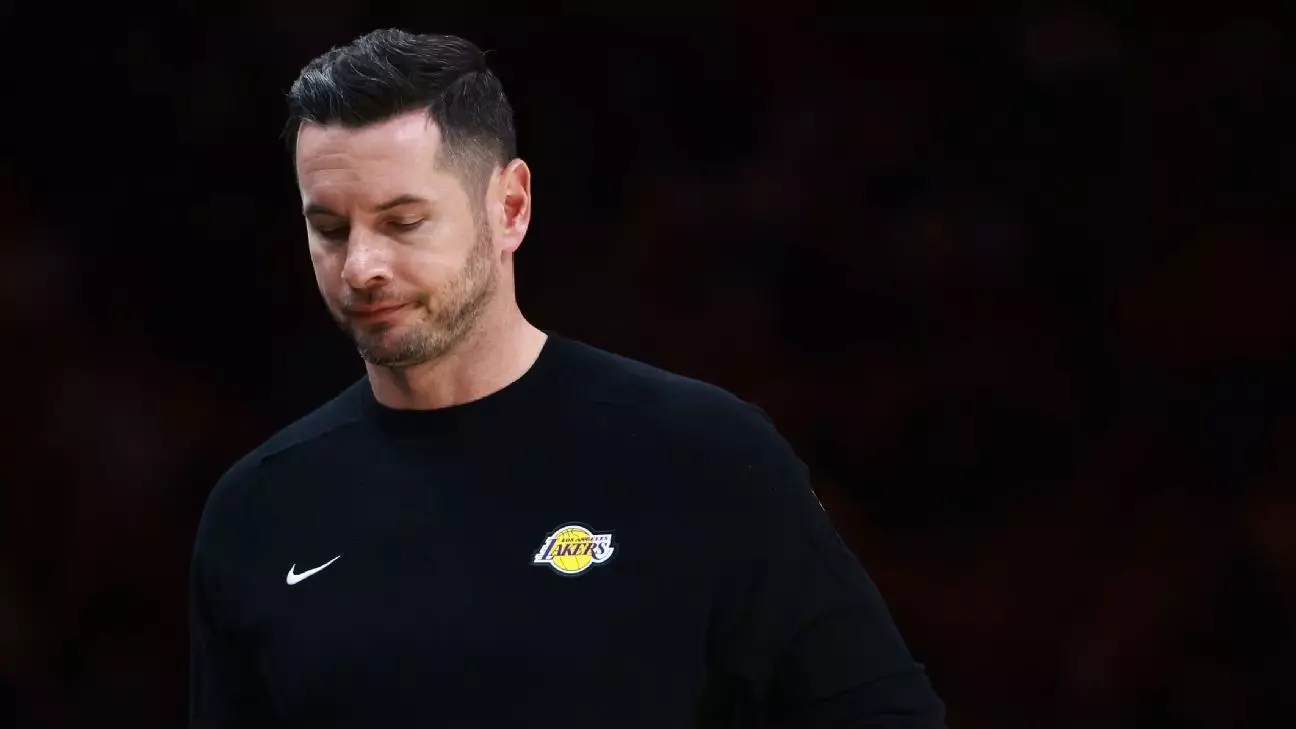The Los Angeles Lakers have found themselves in a perplexing spiral, raising eyebrows across the NBA as they succumb to a string of defeats that has sullied their once-promising season. Less than a month ago, when the Lakers held a commendable record of 10-4, hope was palpable. Fans envisioned a team poised for playoff contention, only to watch in dismay as they lost six of their last eight games, plummeting to a staggering average defeat margin of 21.8 points. The recent 134-93 defeat against the Miami Heat not only underscored this downward trajectory but left the team’s coach, JJ Redick, grappling with the fundamental breakdown in both strategy and execution.
The inexplicable fall from grace raises critical questions about the team dynamics and underlying issues that are festering within the organization. What could have possibly led to such a drastic shift in performance, leaving both players and supporters bewildered?
Redick’s candid post-game reflections reveal the unraveling morale within the Lakers locker room. Describing the team’s plight as “odd,” he emphasized the need for accountability and ownership among the players. This powerful call for responsibility highlights a pervasive lack of cohesion, suggesting that players may be struggling to identify their roles or perhaps feeling overwhelmed by external pressures. Redick’s insistence on taking ownership is commendable, yet it raises an unsettling thought: how can a coach successfully navigate a team on the brink of disintegration when they feel incapable of rallying a squad lacking in unity?
The success of any team heavily depends on both the leadership of its coach and the players’ commitment to executing game plans. However, Redick’s admission of his limitations (‘I can’t physically get us organized’) signifies a disconnect in this framework. The implication that organization and communication are faltering on the court points to deeper issues that need urgent attention.
Acknowledging the Stars and Their Accountability
Amidst the turmoil, LeBron James remains a seasoned figure, attempting to maintain balance by echoing Redick’s calls for accountability. His return to form, with an impressive 29-point performance, serves as a reminder of his caliber but also illustrates the desperation that comes with lone star efforts in the absence of cohesive teamwork. By emphasizing that the responsibility lies not solely with coaching but also with the players, James raises an essential question: how can the Lakers regain their competitive edge when their stars are not consistently stepping up to the plate?
Furthermore, Anthony Davis’s abysmal showing, scoring only eight points in the face of significant expectations, amplifies the urgency of the situation. His acknowledgment of needing to elevate his game is yet another layer that reveals the ongoing struggle for performance consistency. For a franchise that once recognized Davis as a potential MVP candidate, it is startling to witness his apparent regression. His stress on personal accountability shows a frail glimmer of hope, but the real test will be translating those words into tangible results.
Compounding the Lakers’ problems is their inability to find rhythm, especially on the boards. Being outrebounded 52-36 by Miami is symptomatic of a broader issue related to competitiveness and tenacity. The Lakers’ bench’s inability to perform effectively only exacerbates the challenges posed by their starting five. Gabe Vincent’s sentiments about the team being “far off” from their ambitions allude to a collective identity crisis.
Going forward, the Lakers’ storied history underscores the importance of resilience. LeBron’s call for patience—an acknowledgment that ‘it sucks for sure’—stresses that such adversities are part of the sport. Acknowledging the cyclical nature of basketball, where fortunes can shift swiftly, the Lakers must rally themselves for a turnaround, especially with difficult upcoming matchups, including against a red-hot Atlanta Hawks team.
The current plight of the Lakers should serve as a critical wake-up call for the franchise. While raw talent within the team is undeniable, talent alone will not suffice. It’s imperative that they regroup, recalibrate strategies, and emerge with a renewed sense of purpose. The echoes of accountability need to resonate within each player, not just from the front office down to the coaching staff.
As the Lakers forge ahead, the urgency of their situation begs for both leaders and role players to seize control, harness collective identity, and find harmony in chaos. Only through commitment, togetherness, and relentless effort can they navigate out of this storm and rise back to their former glory.

